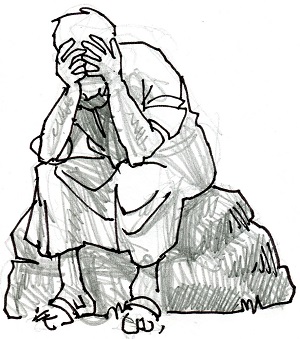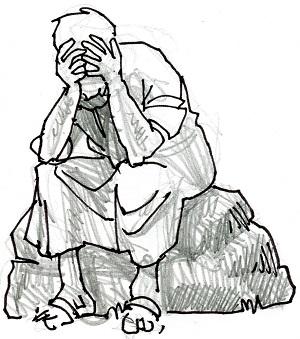

“How often must I forgive?” (Matt 18:21).
Ezek 12:1-12; Matt 18:21—19:1
The Prophet Ezekiel served during the Great Exile into Babylon in the 6th century BCE. His prophecies predate the defeat of Israel, warning of the coming doom, then encourage the people during the exile, and finally offer words of hope in restoration and return. The disastrous defeat and exile of God’s Chosen People introduced into their historical memory the deep need for repentance and forgiveness.
Jesus continually addressed this need in preaching God’s mercy. The only way we can really experience God’s forgiveness is to forgive one another. The “Our Father” makes restoring right relationships with God, neighbor and self, central to finding peace. Refusal to forgive stops the mutual exchange of grace that sets us free from fear, guilt and resentment. Forgiveness makes possible the goal of God’s mercy, the creation of the Beloved Community.
Perhaps the most pointed and powerful appeal Jesus makes for mercy is the parable of the servants in today’s Gospel, prompted by Peter’s question, “How many times should I forgive?” In the story, the master forgives one of his servants a huge debt, yet that servant then refuses to forgive a fellow servant a minor one. The point of the story was that if God has forgiven us unconditionally and extravagantly, we must do the same for others.
This appeal met the greatest resistance, not from sinners, who knew how liberating it was to be forgiven, but from righteous people, who did not think of themselves as needing God’s forgiveness. They failed to grasp that their very existence and every blessing that had made it possible for them to live virtuously was God’s gift. A calculating heart is the enemy of mercy, for it creates the illusion of worthiness compared to the unworthiness of others. Judgment replaces mercy with resentment of others getting any advantage over us. We measure out forgiveness by our own standard of fairness.
Only the experience of needing forgiveness can teach us how important it is to forgive others. And if we want to be truly free, we can’t keep track of offenses. That is not our problem. Unconditional, undeserved love is how we become perfect as our heavenly Father is perfect. That is the lesson that sets us free. Let everyone off the hook, and you will unburden yourself of having to keep accounts, critique other people’s behavior, protect your own perfect score in the "Big Book" that exists only in cartoons and in our own minds.
Peter must have walked away bewildered at the challenge to forgive seventy- seven times, or without limit. But he would understand later, when broken by his own failure to acknowledge Jesus as he was being led away to be crucified, Peter was plunged into despair of ever again facing God or himself or others. Yet, he was being prepared to be the Apostle sent to preach absolute mercy, the total forgiveness he himself had received from Jesus.
Psalm 137 captures the sorrow of those exiled in Babylon, weeping by the river as they remembered their homeland. Don McClean’s popular round, “Babylon” can put us in that place, where sorrow leads to change of heart and the longing to be welcomed again with mercy. https://www.youtube.com/watch?v=4bnhhbV34nI
Advertisement








